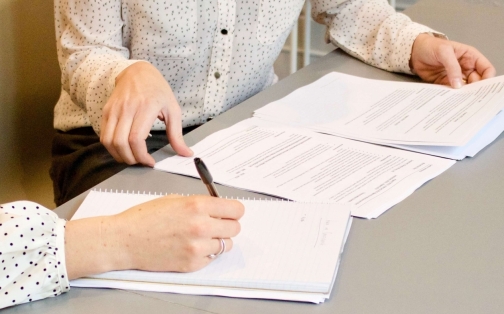
- Home
- News
- Wills, Probate & Trusts
- Is a Will Legally Binding?

Is a Will Legally Binding?
The question ‘is a Will legally binding?’ is one commonly searched for online by those seeking to create certainty and stability for loved ones after their death; if done correctly, the Will produced, and the wishes of the person who created it, must be adhered to.
There are circumstances where a Will can be challenged after the death of the testator (the person making the Will) and often it is down to simple administerial mistakes made during the creation process.
You could avoid the potential angst and arguments that can make up a challenge to a Will by using the skill and expertise of a legal professional, like those working at Winns.
Is a Will legally binding?
The short answer is yes. If the process of creating a Will is done properly, in line with legal requirements, then the document created, and the wishes within it, must be enacted upon when the estate is being distributed.
However, problems can arise in relation to the legality of the documents if the process is not followed and there are oversights made by those involved.
“I used Winns for the Will writing service and they have been fabulous throughout the whole process. I wanted to change my Will after the original draft which was not a problem, the whole process [was] explained thoroughly to me. I wouldn’t hesitate to recommend the Winns Will writing service to others.”
Lauren
What can cause issues when creating a Will?
When following the correct legal processes, there are certain steps that must be taken to ensure the validity of a Will in the eyes of the law:
- The person creating one must be at least 18 years of age
- They should be creating it voluntarily and not being put under pressure by external stakeholders
- The person should be of sound mind and have the mental capacity to create a Will
The Will should be signed and dated in the presence of two independent witnesses (who should be over 18), they should also NOT be:
- Blind
- Beneficiaries in your Will
- The spouse or civil partner of a beneficiary in your Will
- Related to you or any beneficiaries in your Will
- Those witnesses should also sign and date the document, in your presence
- You should not make any handwritten alterations or amendments to your Will.
“Rebecca…has done everything possible and has been extremely professional, kind, courteous, and sympathetic.”
Barbara
How can Winns help?
The dedicated Wills, Probate, and Trusts team at Winn Solicitors can support you through the process of Will creation, matters of Probate and the creation and administration of Trusts, and Powers of Attorney.
Skilled and compassionate in their approach, they have decades of experience in this sector of law and can help you every step of the way to ensure your wishes are acted upon after your death.
“Great service from Rebecca and her team. Very knowledgeable and offered the support and advice needed for our Wills.”
Joanna
Ready to get started and have a free, no-obligation chat about your circumstances? Book a time slot for a call with the team by clicking here and, together, we can get the Will you need to support your loved ones after you’ve gone.
Although this article has answered the question ‘is a Will legally binding?’, you can find out more by about the Will process by clicking on the link above.
Share this article
Meet the Wills, Probate & Trusts Team

Rebecca Harbron Gray
Head of Wills, Probate & Trusts





